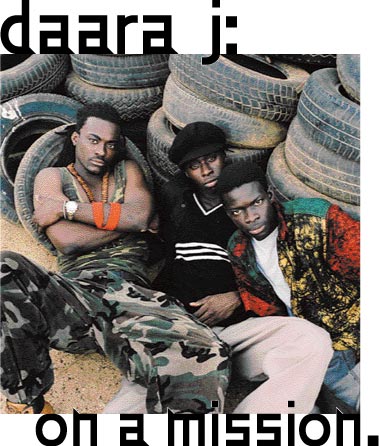|

COVER
STORY | IN THE NEWS | STAGE DOOR |
THE HUM | DIRT | CALENDAR
Aug. 4, 2005

by BOB DORAN

WE'RE ON A MISSION," SAYS
FAADA FREDDY, A MEMBER of the Senegalese hip hop trio Daara J
[photo at left], calling from a hotel somewhere in the Southwest.
What is the mission?
"The mission is to go from
one side of America to the other spreading the message. And the
message remains the same. We try to lift up love with conscious
lyrics, to speak about Africa and how things are around the world,
[about] the globalization. We tell of peace and how we can live
together because there are lots of conflicts going on nowadays.
We're here on behalf of the Africans to remind everybody that
it shouldn't be like that. There's always a solution. Rather
than fussing and fighting we should we'd better learn to live
in peace and live together, because that's the only way to survive."
Do you think Americans have
a false impression of Africa?
"Many do. That's why as
Africans it's important to come over here and say, `This is how
we are. This is the way we live in Africa.' We try to give 'em
a vision about what's going on in Africa and report on what the
Africans think about America, the give and take. A lot of people
from Africa believe in the American dream, they believe once
they step in here, every problem is solved. They say when they
come to America they're gonna start a new life and everything's
gonna be perfect. The thing is, we've seen a lot of Africans
living in America, and most of them have many problems."
Your song "Exodus"
speaks of the immigrants and their troubles. I'm curious about
some Senegalese men I've seen. When I traveled to New York City,
all over there were Senegalese selling fake sunglasses and Rolex
watches. In Europe they were in every large city selling designer
handbags.
"We call them bana bana.
The Senegalese have the reputation to be a good seller and they
are very patient. Even though they are only gaining $5 a day,
for them it's good. They have the patience to make this money
to send back home. It's not always easy. They sometimes live
in bad conditions; they pack six individuals in one room, for
example, in Paris. But they still hang on, even though it's hard.
Some will succeed; others will not. It's part of the reality
when you're on exodus. You can make it, but you can fail as well.
Many times when you go abroad, the whole family will help you
go, then they are back home waiting for you to send some money.
Sometimes everybody has invested in someone, but he gets over
here and he just forgets. In the song "Exodus" we talk
about that.
Why did you choose the hip
hop style to deliver your message?
"We have lots of influences
going from the African roots to the Caribbean, the Cuban music,
even the old soul music from America. Our elders, bands like
Orchestra Baobab, even Youssou n'Dour used to mix these things
with our traditional music. The Senegalese have always adapted.
That's what happened when hip hop came in Senegal. A lot of people
thought, `This music is ours, it sounds like our old tradition,
like tasso, a style from the past.' So there was no difference,
apart from the backing track, the sound derived from the heavy
drums, drum machines and using samplers. In our country [the
backing music] used to be natural with the talking drums, the
natural instruments. The oral style called tasso is what we consider
the ancestor of rap music. The griot spread it all over the country;
they used it to speak about things like equal rights. It's something
that belongs to our everyday lifestyle. It's part of our culture.
That's why hip hop music is not really a big industry in Senegal,
it's still a part of the culture."
What role does Daara J play
in all that?
"In our country, there's
so much to be taught. The opportunity to have the microphone
is not offered to everybody. Once you have that chance, you have
to be careful with the words that you say. That's why you have
to talk for the voiceless; you have to talk on behalf of the
people. It would be very selfish to care only about your own
thing when you know that things around you are not the way they
should be."
Daara J performs at 3 p.m.
Sunday, August 7, at Reggae on the River. The band's new album,
Boomerang, was released this year in America on Wrasse Records.
To learn more about the band, go to www.wrasserecords.com.
Bob
Doran
COVER
STORY | IN THE NEWS | STAGE DOOR |
THE HUM | DIRT | CALENDAR
Comments? Write a
letter!

© Copyright 2005, North Coast Journal,
Inc.
|